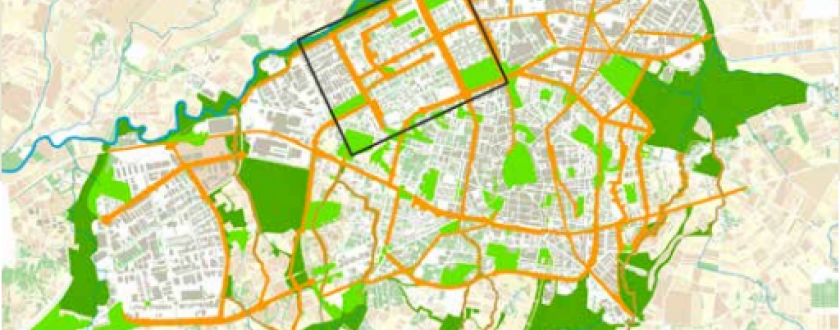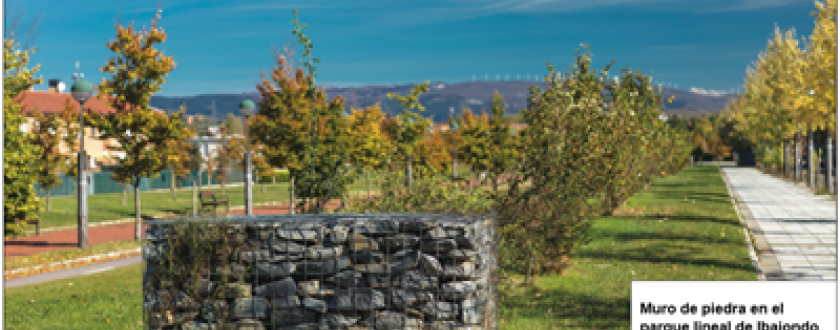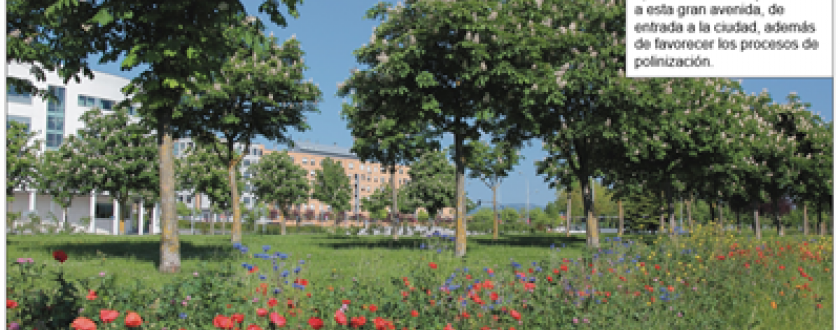Green Urban Infrastructure in Vitoria-Gasteiz. Vacant plot and green space naturalisation project in Lakua
Description of the case study
Vitoria-Gasteiz City Council has implemented its Green Urban Infrastructure Strategy (EIVU) focused on creating and organising a planned network of urban and suburban green spaces with the aim of improving the ecological, environmental, and social functionality of green spaces in the city. These are managed by providing a wide range of ecosystem services that bring public environmental, social, economic, and health benefits.
In order to materialise this strategic proposal, the action taken in the Lakuabizkarra district has been used as a pilot experience to be extrapolated to the city’s other districts.
Lakua’s pilot vacant plot and green space naturalisation project faces the major challenge of converting the municipality into a region that is less vulnerable to the impacts of climate change, initiating the roll-out of its EIVU on a district scale.
This way, the intention is to respond to three major district and municipal-level challenges:
» Improving adaptation ability and resilience
» Reducing its exposure and sensitivity to possible climate impacts
» Increasing community welfare in a sustainable development context
In Lakuabizkarra, there are two coexisting green infrastructure elements with a specific problem: vacant plots owned by the municipality that need a transitional use that will not compromise their future, and green spaces with low ecological function.
As this is a pilot project, the initial aim is to test different types of green infrastructure and naturalisation measures and solutions for their subsequent extrapolation to the city’s other districts and spaces.
The overall basic objectives that characterise the project are:
» Improving environmental and ecological functionality.
» Solving the problem caused by the existence of vacant plots (dirty spaces, urban fragmentation) by converting them into transitional green infrastructure elements.
» Reducing green area maintenance and management costs by applying nature-based solutions.
» Creating an interconnected system of green spaces and vacant plots in the Lakua neighbourhood to promote connectivity with the rest of the Green Infrastructure System (SIV).
Various solutions have been tested in different spaces that act as the key nodes and connectors of the city's Green Infrastructure System, while others act as secondary auxiliary or complementary nodes. The project was developed in 50 spaces of intervention through a wide range of actions:
» 139,000 m² naturalised in Parque Antonio Machado and 133,706 m² naturalised in corridors and medium-sized spaces integrated into the urban space landscape to introduce nature into the city. This naturalisation promotes spontaneous fauna and vegetation colonisation.
» 21,222 m² of forests (fruit trees, Portuguese oak, holm oaks, Mediterranean, and mixed) and 17,411 m² of experimental crops (energy and aromatic plants) to protect the soil and improve the area’s landscape quality, in addition to facilitating bird settling and providing food. The energy crop osier (Salix atrocinerea) combines conservation of biodiversity with the production of biomass for energy purposes, while planting aromatic species improves connectivity between green spaces and provides greater entomological interest.
» 17,352 m² naturalised plots and 11,910 m² flower and shrub meadows to reinforce their role as an ecological corridor that connects the district with the green ring.
» 7,000 m² urban gardens to promote social interactions, participation in the care and maintenance of public space, urban agriculture, and healthy eating.
Case study developed and implemented as a climate change adaptation measure.
The Vitoria-Gasteiz Centre for Environmental Study - Vitoria-Gasteiz City Council (Alava), Municipal Department of Land and Climate Action - Vitoria-Gasteiz City Council (Alava)
Additional Information
The Vitoria-Gasteiz Centre for Environmental Study is responsible for communicating and disseminating Vitoria-Gasteiz’s EIVU and its derived projects. This organisation collaborates directly with the Municipal Department of the Environment (currently Land and Climate Action), which is responsible for the project’s execution. To do this, its website has provided a section on green infrastructure projects that is both technical and informational in nature.
With regard to communication actions, a catalogue of sheets describing each of the planned actions and a flyer that provides a detailed explanation of the entire project have been produced. The goal of these materials is to introduce the project and raise awareness about its need and associated benefits.
From the perspective of its contribution to the EIVU’s aims, the project’s own proposal and implementation is a success in and of itself. Here we can add the actions with vacant lots, in particular the creation of urban vegetable gardens, which are receiving broad support from the public.
In terms of limiting factors that have conditioned the planned actions, we can point to the presence of shallow soil and poor soils that are making it difficult to properly introduce tree vegetation, and are impeding the success of some crops tested in the vacant plots, as is the case with the energy willows.
The total budget for execution is €452,351.40. The project has been subsidised by the Basque Government within the call for subsidies for Municipal Councils, Associations, Local Entities, Local Independent Organisations, Local Development Agencies, and Local Mercantile Companies to carry out sustainable development actions, specifically aligned with atmospheric and climate change (Order dated 22 July 2015, from the Council for Environmental Affairs and Land Policy).
This pilot project is in line with the Basque Autonomous Community’s overall strategy to develop Green Infrastructure. In addition, the General Plan for Urban Zoning constitutes a regulatory and legal framework within which the Green Urban Infrastructure should properly fit, guaranteeing its implementation, and producing and stipulating new ordnances, or properly changing those that already exist.
01/01/2015 - 12/31/2019 (4 years - completed)
Reference information
PYRENEAN CLIMATE CHANGE OBSERVATORY
Avenida Nuestra Señora de la Victoria, 8
22.700 - Jaca
Huesca - España
+34 974 36 31 00
info_opcc@ctp.org







